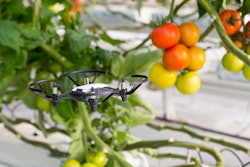
Increasingly, consumers are asking questions about the food they eat. Where did this ear of corn or piece of beef come from? Is it genetically modified? Was it grown ethically in the United States? Answering these questions has historically been complicated, but blockchain technology offers an opportunity to change all of that and give a verifiable picture into where products come from and where they’ve been on their way to the table.
Right now, the ways to manage the supply chain are severely lacking. There are so many players -- growers, manufacturers, packers, distributors, shippers and retailers, to name a few. Each interacts with agricultural products across the supply chain in different ways, but hasn’t had the means to precisely record pertinent data or communicate very effectively with each other. This results in failure to share important information about assets in which they all have a vested interest. With so many parties involved, important data falls through the cracks, ultimately making it impossible to have a full, accurate picture of the food being distributed.
The real-world costs of poorly managed supply chains
This disorganization hurts the bottom lines for everyone involved. For example, current industry standards create costly, unnecessary inventory management inefficiencies. Businesses are forced to overcompensate, shipping and storing extra inventory to make up for uncertainties throughout the supply chain. These undue costs are estimated to be 15-40% of total inventory spending, representing major losses over a needless problem.
Another obstacle is the procurement discount process. It’s extremely challenging to trace the myriad of purchases and transactions that businesses and their subsidiaries make. As such, organizations looking to negotiate discounts based on these data points are often left in the dark about their own assets. This results in lost opportunities for procurement discounts, preventing some key cost-saving measures from fully going into effect.
On top of all of this, supply chain mismanagement leads to an over-reliance on costly intermediaries. Because businesses don’t share and agree on key pieces of information, central intermediaries are often called in to handle unnecessarily complex disputes or negotiations. This is an expensive process that profits off avoidable disorganization.
Finding new ways to remedy supply chain inefficiencies is absolutely crucial -- not only to protect bottom lines, but also to maintain a competitive edge in an ever-changing sector. It is more important than ever to have complete command over data, and blockchain solutions can make this ambitious goal a reality.
Blockchain technology: a secure, verifiable solution to alleviate supply chain issues
Blockchain is an immutable ledger that enables its users to securely record and share their data. Simply put, blockchain works by storing data in interconnected blocks. To access the data within a block, you need to communicate with the block before it, creating an unhackable, immutable chain of information that can be shared between different parties. This allows for a new kind of data management, where critical information can be safely added and traced from one end of the supply chain to the other.
The potential of this technology is enormous. Right now, when most people hear the word “blockchain,” they think of Bitcoin and the frightening volatility of the cryptocurrency markets. In reality though, blockchain can be applied to so much more than just currency exchange. This revolutionary technology has the capacity to change the way we do business by eliminating excess spending, replacing outdated IT infrastructures and solving key operational problems.
Where’s the beef? Blockchain in action for sourcing cattle
A great example of the power of blockchain in action is in beef sourcing. By implementing the right technology, stakeholders in the beef industry can get real results when it comes to solving supply chain issues and increasing the value of their product. Blockchain gives the ability to track key information about every calf raised. Any data that producers and consumers want about their beef -- for example, its place of birth, vaccine status, health issues and antibiotic husbandry -- can all be recorded and transmitted seamlessly through the entire supply chain.
These capabilities are unprecedented. Never before has complete end-to-end data aggregation been actualized. Other supply chain management solutions simply cannot compete with the scale, accuracy and security that blockchain can provide. There’s a reason this technology has come to the forefront in such a huge way in the past year. The beauty of blockchain is that it can be applied to any supply chain issue in agriculture. Take seeds, for example. The same principle can be applied to an ear of corn, soybean sourcing, or really any other agricultural product that comes to mind.
The result: better tracking, more data for knowledge-hungry consumers and higher-value products
In the agricultural world, blockchain solutions can be used to resolve a multitude of supply chain issues. By keeping better track of key data points from many players, businesses could save significant amounts of money on issues like inventory overcompensation, procurement discount mismanagement and unnecessary intermediaries.
Additionally, more effectively tracing data can help businesses charge a premium for certain products. Blockchain solutions help consumers who are looking for “organic” or “humanely raised” food feel more confident about the labels they see and buy in the grocery store.
The supply chain status quo is no longer sustainable. Businesses cannot afford to keep making important decisions based on faulty, incomplete data. Data about assets is becoming an asset itself, increasingly informing how companies operate and how consumers choose what products they want to buy. Implementing blockchain solutions can help companies capitalize on this industry-wide transformation, changing the way we do business for the better.




















